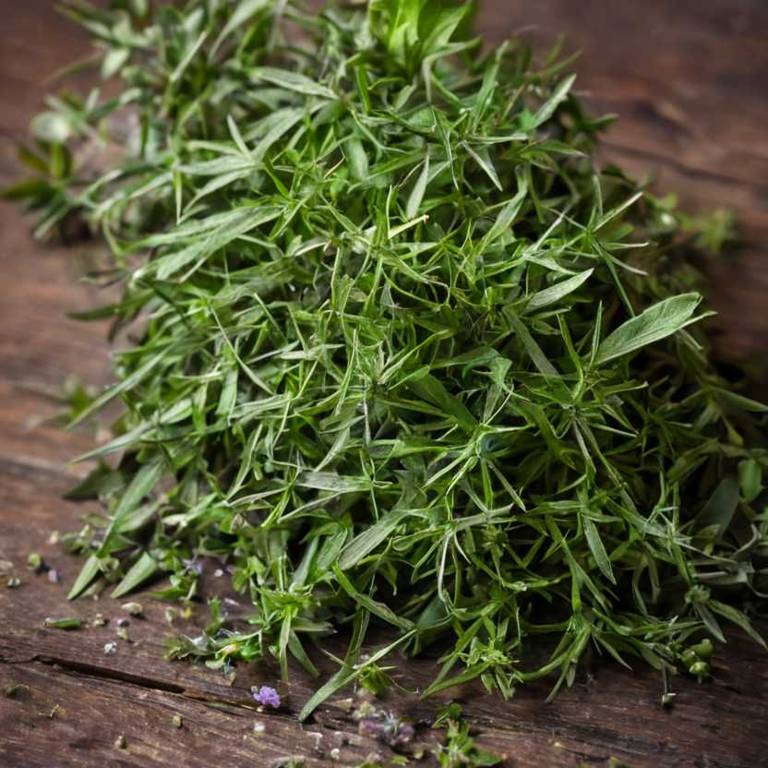By Leen Randell
Updated: Jul 20, 2024
10 Medicinal Constituents Of Hyssopus Officinalis (Hyssop)

Hyssopus officinalis has active constituents such as flavonoids, phenolic acids, and essential oils.
These constituents contribute to the plant's medicinal properties, including anti-inflammatory and antimicrobial activities. For instance, flavonoids have been shown to reduce inflammation and improve respiratory function, while essential oils have been used to treat digestive issues and skin conditions.
By utilizing hyssop's medicinal constituents, individuals can experience improved health outcomes, such as enhanced respiratory function and reduced inflammation.
This article explains in details the 10 best active constituents of Hyssopus officinalis.
1. Ursolic acid
Hyssopus officinalis ursolic acid is a bioactive compound extracted from the leaves of this perennial herb.
Ursolic acid has been extensively studied for its potential health benefits, including antioxidant, anti-inflammatory, and anticancer properties. It has been shown to inhibit the growth of cancer cells, reduce oxidative stress, and improve cardiovascular health by lowering cholesterol levels and blood pressure.
Additionally, ursolic acid may also have antimicrobial and antiviral effects, making it a promising natural compound for various therapeutic applications.
2. Rosmarinic acid
Hyssopus officinalis rosmarinic acid is a naturally occurring compound found in the plant's leaves and flowers.
It is a phenolic acid that has been traditionally used for its medicinal properties, including antibacterial, anti-inflammatory, and antioxidant activities.
Research has shown that rosmarinic acid can help to protect against oxidative stress and may have potential applications in the treatment of various diseases, including cancer and cardiovascular disease.
3. Carnosol
Hyssopus officinalis carnosol is a natural compound extracted from the leaves of this perennial herb.
Carnosol has been found to exhibit numerous biological activities, including antioxidant and anti-inflammatory properties, making it a potential therapeutic agent for various diseases.
Additionally, its antimicrobial and antiviral effects have shown promise in the prevention of infections and the treatment of respiratory issues such as bronchitis.
4. Carvacrol
Hyssopus officinalis carvacrol is a natural compound extracted from the essential oil of the herb.
This bioactive compound has been traditionally used in medicine for its antimicrobial and anti-inflammatory properties. Carvacrol has been shown to possess potent antibacterial activity against various microorganisms, making it an effective agent against wound infections and other bacterial-related diseases.
Its antispasmodic effects also contribute to its use as a natural remedy for digestive issues.
5. Thymol
Hyssopus officinalis thymol is a natural compound extracted from the leaves and flowers of the plant.
It has been used for centuries in traditional medicine to treat various ailments, including respiratory issues, skin conditions, and digestive problems. Thymol possesses antimicrobial properties, making it effective against bacteria, viruses, and fungi, and is often used as an antiseptic and disinfectant.
Its unique aroma and flavor are also valued in culinary and perfumery applications.
6. Beta-caryophyllene
Hyssopus officinalis beta-caryophyllene is a sesquiterpene compound extracted from the essential oil of this perennial herb.
This natural substance has been traditionally used in traditional medicine and aromatherapy for its anti-inflammatory, antimicrobial, and antioxidant properties.
Beta-caryophyllene has also been found to have potential therapeutic benefits, including reducing pain and inflammation, improving respiratory health, and exhibiting antitumor activity.
7. Cineole
Hyssopus officinalis cineole is a bioactive compound extracted from the leaves and flowers of the plant.
It has been traditionally used in herbal medicine for its antiseptic, anti-inflammatory, and expectorant properties.
Cineole is also responsible for the characteristic aroma and flavor of hyssop, which is often used as an ingredient in teas, infusions, and herbal remedies to soothe respiratory issues and promote digestion.
8. Linalool
Hyssopus officinalis linalool is a natural compound derived from the leaves and flowers of the plant.
It has been used for centuries in traditional medicine, particularly in Middle Eastern and Mediterranean cultures, to treat a range of ailments including respiratory issues, digestive problems, and skin conditions.
Linalool has also been shown to have antimicrobial and anti-inflammatory properties, making it a popular ingredient in herbal remedies and aromatherapy products.
9. Sabinene
Hyssopus officinalis sabinene is a sesquiterpene compound found in the essential oil of the plant.
It is responsible for its distinct aroma and flavor, which has been used for centuries in traditional medicine and cooking.
Sabinene has been reported to possess anti-inflammatory, antioxidant, and antimicrobial properties, making it a valuable component in skincare products and natural remedies.
10. Gamma-terpinen
Hyssopus officinalis gamma-terpinen is one of its primary essential oils.
This monoterpene has been extensively studied for its numerous biological and pharmacological properties, including antimicrobial, antiviral, and antioxidant activities.
Gamma-terpinen has also shown potential in the treatment of various diseases, such as bronchitis, allergies, and even cancer, making it a valuable compound in traditional medicine and modern research applications.